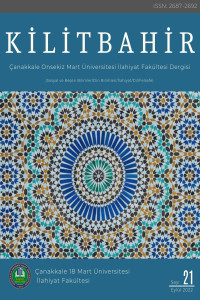Abstract
İslam hukuna göre vakit, ibadetler için belirleyici bir etkendir. Vakitle kayıtlanmış (mukayyed) yükümlülükler, ibadet için belirlenen vakitle emredilen ibadet arasındaki ilişki dikkate alınarak bir taksimata tabi tutulmuş, müvessa‘ ve mudayyak vacip olmak üzere ikiye ayrılmıştır. Hanefîler bu vakitleri zarf ve mi‘yâr olarak isimlendirmişler; ama her iki vakte de görece benzerliği nedeniyle üçüncü bir vakit türü daha ekleyerek buna da müşkil vakit adını vermişlerdir. Ne var ki bunun tek örneği hac ibadetidir. Bu ibadetin vaktinin neden müşkil sayıldığına dair ise iki farklı gerekçe zikredilir. Birincisi; her yıl hac aylarının tekrarlanması ve hangi yıl hac yapılacağına dair bir delilin olmamasıdır. İkincisi ise hac ibadeti için ayrılan süre içerisinde haccın rükünlerini birden fazla yapmaya yetecek kadar zaman olsa da dinen bunun geçerli sayılmamasıdır. Bu gerekçeler hac örneği üzerinden incelendiğinde ise işkâlin sadece iki ihram konusunda olduğu görülmektedir. Hac vaktinin müşkil olarak kabul edilmesinin hükme yansıyan ve sonuca etki eden pratik bir faydası görülmemektedir. Asıl itibariyle birbirini tamamlayan farklı rükünlerden oluşan hac ibadetinin bir bütün olarak değerlendirilmesi, müşkil vakit ayırımına ihtiyaç bırakmayacak bir yaklaşım olabilir. Bir mükellefin aynı yıl içerisinde birden fazla hac yapamayacağına dair ittifak ise haccın vaktini müşkil olmaktan çıkartan bir anlayış olarak kabul edilebilir. Aynı yılda bir kişi adına birden fazla kişinin yaptığı hacların kabul edilmesi ise, hac vaktinin ibadetin doğrudan kendisiyle değil mükellefle ilgili olduğunu göstermektedir.
Keywords
Supporting Institution
Yok
Project Number
Yok
References
- Bardakoğlu, Ali. “Edâ”. Türkiye Diyanet Vakfı İslâm Ansiklopedisi. 10/389-392. İstanbul: TDV Yayınları, 1994.
- Bessâm, Abdullah b. Abdürrahman b. Sâlih el-Bessâm. Tavdîhu’l-Ahkâm min Bulûği’l-Merâm. 7 Cilt. Mekke: Mektebetu’l-esedî, 5. Basım, 2003.
- Cessâs, Ebû Bekr Ahmed b. Alî er-Râzî el-Cessâs. el-Fusûl fi’l-usûl. 4 Cilt. Kuveyt: Vezâratü’l-evkâf, 2. Basım, 1994.
- Debûsî, Ebû Zeyd Abdullah (Ubeydullah) b. Muhammed b. Ömer b. Îsâ ed-Debûsî. Takvîmü’l-edille. Thk. Halîl Muhyiddîn el-Meys. Beyrût: Dâru’l-kütübi’l-ilmiyye, 2001.
Abstract
According to Islamic law, time is an essential factor in the field of worship. Time-limited orders (muqayyad), were divided into two as muwassa‘ (expanded) and muḍayyaq (constricted), by considering the relationship between the time set for worship and the worship itself. Hanafi scholars named these times as container (tharf) and criterion (mi‘yār). Besides, Hanafis referred to the third type of time and called it “mushkil time.” Two reasons are mentioned for the hajj to be problematic, which is the only example of this complex time. When examining these reasons through the example of hajj, the problem appears in two issues of the iḥrām only. There is no practical benefit in the ruling or in the results from considering the time of hajj as problematic. Considering the hajj as having different pillars that complement each other may lead to an approach that does not need for limited-time allocation. The consensus that a person cannot perform hajj more than once in the same year can eliminate the problem of considering the hajj as a problematic time. Considering that the hajj performed by more than one person on behalf of another person in the same year is acceptable in İslamic fiqh indicates that the time of hajj is not directly related to the worship itself but instead to the person.
Keywords
Project Number
Yok
References
- Bardakoğlu, Ali. “Edâ”. Türkiye Diyanet Vakfı İslâm Ansiklopedisi. 10/389-392. İstanbul: TDV Yayınları, 1994.
- Bessâm, Abdullah b. Abdürrahman b. Sâlih el-Bessâm. Tavdîhu’l-Ahkâm min Bulûği’l-Merâm. 7 Cilt. Mekke: Mektebetu’l-esedî, 5. Basım, 2003.
- Cessâs, Ebû Bekr Ahmed b. Alî er-Râzî el-Cessâs. el-Fusûl fi’l-usûl. 4 Cilt. Kuveyt: Vezâratü’l-evkâf, 2. Basım, 1994.
- Debûsî, Ebû Zeyd Abdullah (Ubeydullah) b. Muhammed b. Ömer b. Îsâ ed-Debûsî. Takvîmü’l-edille. Thk. Halîl Muhyiddîn el-Meys. Beyrût: Dâru’l-kütübi’l-ilmiyye, 2001.
Details
| Primary Language | Turkish |
|---|---|
| Subjects | Religion, Society and Culture Studies |
| Journal Section | Research Articles |
| Authors | |
| Project Number | Yok |
| Publication Date | September 18, 2022 |
| Submission Date | June 12, 2022 |
| Published in Issue | Year 2022 Issue: 21 |
Our journal, which was published as Çanakkale Onsekiz Mart University Journal of Theology Faculty, changed its name to Kilitbahir as of August 1, 2019.
Creative Commons License
This work is licensed under a Creative Commons Attribution-NonCommercial 4.0 International License.


